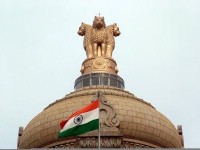 On January 28th, 2009, Election Commissioner Dr. S.Y. Quraishi announced that the elections would be held between April 8th, 2009 and May 15th, 2009, though the exact polling dates would only be announced in due course. So the fever of Indian elections is on the way. Let’s be prepared for the fever. Since independence, elections in India have evolved a long way, but all along elections have been a significant cultural aspect of Independent India. Today I will discuss about the Prime Ministerial Candidates for Indian general election 2009. Before this let me tell you the three alliances or fronts in Indian politics.
On January 28th, 2009, Election Commissioner Dr. S.Y. Quraishi announced that the elections would be held between April 8th, 2009 and May 15th, 2009, though the exact polling dates would only be announced in due course. So the fever of Indian elections is on the way. Let’s be prepared for the fever. Since independence, elections in India have evolved a long way, but all along elections have been a significant cultural aspect of Independent India. Today I will discuss about the Prime Ministerial Candidates for Indian general election 2009. Before this let me tell you the three alliances or fronts in Indian politics.
United Progressive Alliance – United Progressive Alliance (UPA) is the present ruling coalition of political parties heading the government of India. The coalition is led by the Indian National Congress, which is currently the single largest political party in the Lok Sabha (the lower house of the parliament of India). The Prime Minister of India, Manmohan Singh, and the Council of Ministers are members of the UPA. Congress’s President, Sonia Gandhi, is the current Chairperson of the UPA.
- Indian National Congress
- Rashtriya Janata Dal
- Dravida Munnetra Kazhagam
- Nationalist Congress Party
- Jharkhand Mukti Morcha
- Jammu and Kashmir National Conference
- Samajwadi Party
- Pattali Makkal Katchi (PMK)
National Democratic Alliance – The National Democratic Alliance (NDA) is a coalition of anti-Congress and anti-left political parties in India. It is led by the Bharatiya Janata Party and had 13 constituent parties at the time of its formation in 1998. The convenor of NDA is Sharad Yadav, and its honorary Chairman is former Prime Minister Atal Bihari Vajpayee. Lal Krishna Advani, is the Leader of the Opposition in the Lok Sabha; Jaswant Singh, is Leader of the Opposition in the Rajya Sabha; and Charanjit Singh Atwal, who is the Deputy Speaker in the Lok Sabha are all from NDA.
- Bharatiya Janata Party
- Shiv Sena
- Biju Janata Dal
- Shiromani Akali Dal
- Janata Dal (United)
- Asom Gana Parishad
- Rashtriya Lok Dal
- Indian National Lok Dal
- Nagaland Peoples Front
- Manipur People’s Party
- United Democratic Party
Third Front – Third Front consists of Leftist (Communist) and other regional parties of India.
- Communist Party of India (Marxist)
- Communist Party of India
- Telugu Desam Party
- Marumalarchi Dravida Munnetra Kazhagam
- All India Forward Bloc
- Janata Dal (Secular)
- Revolutionary Socialist Party
- Telangana Rashtra Samithi
- Kerala Congress (Joseph)
Prime Ministerial Candidates for Indian general election 2009
United Progressive Alliance : There are chances that Prime Minister Manmohan Singh would be projected as the Prime Ministerial candidate in the next elections. The only concern is his health. Actually on January 24th, 2009, Manmohan Singh underwent cardiac bypass surgery at All India Institute of Medical Sciences, New Delhi. Following the surgery, speculation of alternate PM candidates arose both within the Congress and amongst coalition partners.
National Democratic Alliance :: The main opposition, the Bharatiya Janata Party (BJP) and its coalition partners in the National Democratic Alliance, announced on December 11, 2007 that their candidate for prime minister would be BJP party leader Lal Krishna Advani, the Leader of the Opposition. On January 23, 2008, leaders from BJP and other NDA parties convened to officially elect him their candidate.
Third Front :: Among the possible members are the United National Progressive Alliance, India’s Left parties and the Bahujan Samaj Party. The Indian media has speculated that Mayawati, the chief minister of Uttar Pradesh, could potentially be projected as the front’s Prime Ministerial candidate, but no official move has taken place yet. If Mayawati’s party can win enough seats, she has openly stated that she would be willing to take the support of the national parties to become Prime Minister. However it would be very difficult for her to run a stable government.
In my opinion, either UPA or NDA should get the majority and form a stable Government. There are many challenges to our national security especially after Mumabi taj attacks, also the worsening political situation in Pakistan may endanger our national security and peace. Now a days, we have a big economic recession, unemployement problem, corruption and criminalisation. A weak and unstable Government will not be able to address these issues.

Godd summing up of Indian Election scenario.
Harb (www.7rcr.com)
(7rcr means 7 Race Course Road)
Hope who ever wins, has the courage to take Pakistan head-on.
I want to know more about how this general election campaigns by parties and how are thwey utilizing technology to reach out to people..their votebanks
nice post..